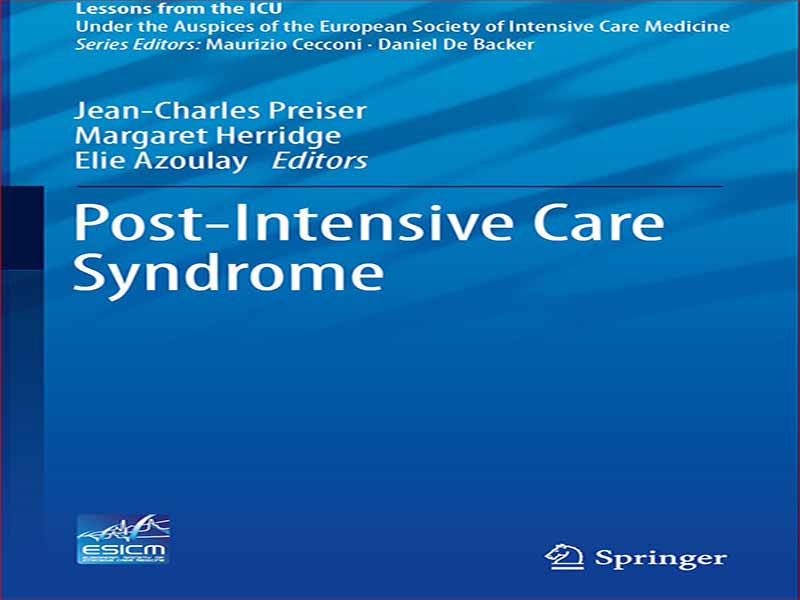- عنوان کتاب: Post-Intensive Care Syndrome
- نویسنده: Jean-Louis Vincent, MD, PhD
- حوزه: ICU
- سال انتشار: 2020
- تعداد صفحه: 374
- زبان اصلی: انگلیسی
- نوع فایل: pdf
- حجم فایل: 9.34 مگابایت
تا همین اواخر، نقش ما بهعنوان متخصصین ویژه تنها بر مدیریت بیماران در بخش مراقبتهای ویژه (ICU) متمرکز بود، با اندکی (در صورت وجود) در مورد دوره پس از ترخیص بیمار. خوشحال بودیم که بیمار از بیماری وخیم خود جان سالم به در می برد و به مرحله ای می رسید که ترخیص می شد! با این حال، در سالهای اخیر، ما به طور فزایندهای از پیامدهای طولانیمدت بیماران ICU آگاه شدهایم – مشکلات جسمی، شناختی و/یا روانی که بسیاری از بیماران ماهها و حتی سالها پس از ترخیص از ICU با آنها مواجه میشوند. تأثیر روانی بیماری بحرانی بر اعضای خانواده نیز نگران کننده است، زیرا بسیاری از بستگان نزدیک سال ها پس از ترخیص عزیزشان از علائم اضطراب، استرس پس از سانحه و افسردگی رنج می برند. نکته مهم این است که بسیاری از این شکایات پس از ICU را می توان با بهبود مدیریت بیمار در طول پذیرش ICU کاهش داد. آرامبخشی کمتر، استفاده دقیقتر از داروهایی که بر نتایج طولانیمدت تأثیر میگذارند مانند کورتیکواستروئیدها، بسیج زودهنگام، بهبود حمایت تغذیهای، ارتباط بهتر و مشارکت اعضای خانواده نمونههایی از رویکردهایی هستند که میتوانند به محدود کردن توسعه و شدت بیماریهای پس از درمان کمک کنند. عوارض ICU و بهبود کیفیت زندگی بعد از ICU. به عنوان متخصص، ما باید نه تنها در مورد بقا فی نفسه بلکه در مورد کیفیت آن بقا نیز فکر کنیم تا در مورد اینکه چگونه مداخلات ما ممکن است بر سلامت و رفاه هر بیمار و خانواده او پس از ترخیص تأثیر بگذارد، فکر کنیم. با افزایش تقاضا برای مراقبتهای ویژه و کاهش میزان مرگ و میر در بخش مراقبتهای ویژه، جمعیت بازماندگان بخش مراقبتهای ویژه نیز در حال افزایش است و نیاز فوری به افزایش آگاهی در مورد سندرم مراقبتهای ویژه، بهبود درک ما از مکانیسمها و علل زمینهای را به همراه دارد. تعیین بهترین روش برای پیشگیری و درمان این عوارض. این کتاب که توسط متخصصان بینالمللی در این زمینه نوشته شده است، بنابراین یک جلد مهم و بهموقع و ارزشمند برای همه متخصصان است زیرا ما در تلاش هستیم تا نتایج بلندمدت و با کیفیت زندگی را برای بیماران و خانوادههایشان به حداکثر برسانیم.
Until relatively recently, our role as intensivists focused solely on managing patients within the intensive care unit (ICU), with little (if any) thought about the patient’s post-ICU discharge course. We were happy if the patient survived their critical illness and reached a stage where they could be discharged! In recent years, however, we have begun to be increasingly aware of the long-term outcomes of ICU patients – the physical, cognitive, and/or psychological problems that are encountered by many patients for months and even years after their ICU discharge. The psychological impact of critical illness on family members is also a concern, with many close relatives suffering symptoms of anxiety, posttraumatic stress, and depression for many years after the discharge of their loved one. Importantly, many of these post-ICU complaints could be reduced with improved patient management during the ICU admission. Less sedation, more careful use of medications known to impact long-term outcomes such as corticosteroids, earlier mobilization, improved nutritional support, better communication, and involvement of family members are some examples of approaches that can help limit the development and severity of post-ICU complications and improve post-ICU quality of life. As intensivists, we need to think not just about survival per se but also about the quality of that survival to reflect on how our interventions may impact the health and well-being of each patient and their family after discharge. As the demand for intensive care increases and ICU mortality rates decreases, so the population of ICU survivors is also increasing, carrying with it an urgent need to heighten awareness of post-intensive care syndrome, improve our understanding of the underlying mechanisms and causes, and determine how best to prevent and treat these complications. This book, written by international experts in this field, is therefore an important and timely volume and of value for all intensivists as we strive to maximize long-term, quality-of-life outcomes for our patients and their families.
این کتاب را میتوانید بصورت رایگان از لینک زیر دانلود نمایید.
Download: Post-Intensive Care Syndrome





































نظرات کاربران